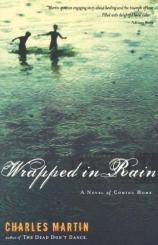Reading Group Guide
Discussion Questions
Wrapped in Rain: A Novel of Coming Home

1. What is the meaning of the title? Discuss the apparent incongruity of being "wrapped" in something that is both transparent and wet, something that most of us try to avoid getting "caught" in.
2. What are some of the roles that actual rain plays in the story's events?
3. How does Miss Ella's surname represent her role in the story?
4. Note that Mutt's first act upon returning to Waverly is to drain the water tower of dirty, "putrid" water. What does this symbolize? Why had this chore been neglected by Tucker?
5. Two important passages about Jesus and children are found in the book of Matthew: "unless you . . . become like little children, you will never enter the kingdom of heaven" and "let the little children come to me . . . for the kingdom of heaven belongs to such as these." What do you think the author wants us to understand by naming the second brother Matthew? What is the real significance of his nickname?
6. Miss Ella tells the boys repeatedly that "love always wins." What does she mean by that? Discuss the ways in which love trumps the other forces at play in the story.
7. Tucker tells us that "if Mutt was good at one thing, it was hiding." But several of the characters in the story seem to be hiding something, or hiding from something. What must each of them find in order to resolve their own conflict?
8. The author often likens Waverly to hell, or purgatory, as indicated in the descriptions of the property --- from the weeping mortar of the house, to the self-created quarry used to build it, to its owner Rex. Yet the property also contains a church, reminders of Miss Ella's love and care are all over the property, and Tucker, Mutt, and Katie are all drawn to it as if to a sanctuary. Discuss the conflicting role Waverly plays in the lives of the main characters.
9. Tucker refers often to the boat resting below the surface of the spring water that fills the quarry. What other issues in the story lay below the surface, yet in plain view?
10. Imagery of fathers and sons abounds, from the father and boys at the boat dock to the substitute father Tuck represents for Jason. Yet the predominant father image is the horrible one represented by Rex. Tucker is angry with his father for abandoning him, yet Miss Ella reminds him that "you've always had a Father." What does she mean?
11. Doc tells Tuck that as a photographer, "you see things that others don't." But Tuck seems blind to many things. What role does Doc play in the story?
12. Human suffering, particularly the agony of Jesus, is one of the most powerful messages in Christianity. Discuss the ways in which Mutt is a Christ-figure in the story, from his teaching to his suffering and rebirth.
13. In baseball, even the best hitters strike out more often than they hit home runs. Discuss the author's use of baseball as a metaphor for life. Why does Miss Ella admonish Tuck with "Why're you living your life so differently than you played baseball?"
14. Mutt tells his brother that home is where Tucker is. What are the various homecomings represented in the story?
15. Baptism, and the notion of rebirth, is the most important celebration in Christian life, and Waverly, in the object of the water tower, has its own baptismal font. What symbolic "baptisms" occur in the novel? What triggers each one, and what is the significance?
16. Miss Ella asks Moses to dig Tucker's grave for him and let him fill it in. Why does she do this?
17. Both Miss Ella and Tucker refer to the Twenty-fifth Psalm as a source of comfort. Review this passage and discuss the parallels to characters and trials in the book.
18. Isaiah 11:6 contains the passage ". . . and a little child will lead them." Discuss the ways in which Jason leads Tucker to forgiveness, and the ways Mutt leads the reconstituted family to redemption. Look at the rest of this verse and consider the meaning as it relates to the novel.
19. Mutt's "root issue," as Gibby refers to it, stems from the night he watched Rex beat Miss Ella. How does Tucker's acknowledgement that it wasn't Mutt's fault affect Mutt's stability? How does it affect Tucker? Katie?
20. Miss Ella knows that both Tucker and Mutt will be destroyed if they allow themselves to hate Rex. What changes occur after Tucker verbalizes his forgiveness to Rex and leaves the baseball bat in his room? What other events in the storyline occur only because someone chose to forgive? How might the story have ended if any one of those people had chosen to hold on to hate or anger? How have you seen forgiveness affect people in your life?
21. Miss Ella knew with certainty that her calling in life was to care for and protect Tucker and Mutt. What was Tuck's calling? Mutt's? What is your calling?
22. The novel contains several non-beautiful, even grotesque, characters, such as Bessie, Whitey, the pierced waitress, Judge, and Miss Ella. What role do they play in the story? What is Miss Ella trying to teach Tucker as she constantly reminds him to look below the surface when he interacts with these people? Why are the lenses through which we view the world so important?
23. Mutt is the one who is certifiably insane, but both he and Tucker hear voices. Which of the brothers do you think is the most sane? What are the differences in the voices Mutt hears and the ones Tucker hears?
24. Tucker holds baseball in high regard, especially as an important experience in the father-son relationship. Why? What is the significance of him playing baseball with Jason?
Wrapped in Rain: A Novel of Coming Home
- Publication Date: February 28, 2005
- Genres: Fiction
- Paperback: 336 pages
- Publisher: Thomas Nelson
- ISBN-10: 0785261826
- ISBN-13: 9780785261827








